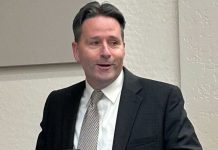The Open Government Commission—tasked with ensuring that citizens are provided with greater access to information—quashed the Gilroy Dispatch’s appeal of a denied records request for the names of the City’s disabled public safety retirees.
At the May 29 meeting, City Administrator Tom Haglund—and both the city attorney and assistant city attorney—presented the City’s position that releasing the names of the six police and fire retirees who claimed a work-related disability in the past five years would violate state and federal law.
In February, the city of Bell released the names of eight retired disabled police officers to the Dispatch after a formal request under the California Public Records Act. But Haglund and Assistant City Attorney Jolie Houston said, after speaking with Bell’s city attorney, the circumstances surrounding the release of their names were different than those in Gilroy.
According to Houston, an assistant city attorney in Bell told her they released the names because they had already appeared in an article published in the Los Angeles Times.
“They released it because it was already public,” Houston said.
“The names that the city released were already in the public domain or otherwise publicly available, which did not require them to obtain the information from confidential employee medical files,” Haglund added.
After the meeting, the Dispatch requested the articles referred to by City officials. Six of the eight names obtained by the Dispatch were published, which surfaced during the fallout of the numerous scandals in Bell.
But two names received by Bell were not made public, nor were they included in any of the articles. A search of the LA Times archives by the Dispatch turned up no results for those two names either.
Additionally, requests for copies of communication between City officials and Bell officials were not returned by press time.
For Gilroy officials to obtain the names requested by Dispatch, Haglund said they would need to access confidential medical files maintained by the California Public Employees Retirement System. Doing that with the intention of releasing disability status information would violate nondisclosure agreements and state law, City officials argued.
The Dispatch’s requests for the names—a battle fought over the course of 10 months—stemmed from a Santa Clara Grand Jury report that claimed too many public safety retirees in Gilroy were claiming an industrial disability. In the past five years, six of 14—43 percent—police and fire retirees claimed a work-related disability. Of the six, four claimed a disability after they retired.
In the report, the Grand Jury urged Gilroy to rigorously review it’s industrial disability retirement data and implement a plan to lower the rate at which industrial disability occurs.
“Some illnesses and injuries that result in an industrial disability retirement are presumptive and benefits are automatically provided under the Government Code,” Haglund wrote to the Grand Jury in response.
When public safety employees file for disability after retiring, they file an application with CalPERs, Human Resources Manager LeeAnn McPhillips explained. After receiving a letter from CalPERS, the city must make a determination.
In order to receive a disability retirement, a physician must examine the retiree and determine whether a disability could have been caused during the course of employment. With a physician’s determination that the retiree was injured on the job, the city’s hands are tied.
“The doctor is the one who is making the determination after examining the patient and their test results,” McPhillips said.
When Commissioner Luann Manseau asked City officials if the Dispatch could file a request for the names of the physicians who determined the disability status of each retiree, Haglund said that would also be illegal.
“We can’t provide any information that would lead to the identity of the individuals,” Haglund said. “We can’t do that, especially if what we’re accessing is a confidential file to gain that information.”
“I’d have some concerns in releasing the names of the physicians and maybe privacy and defamation concerns,” Houston added.
According to CalPERS, industrial disability retirees are not prohibited from working in the private sector—and there is no limit on their earnings. Additionally, 50 percent of the pensions for public safety employee who receive industrial disability status after they retire are tax-free.
Robin Egbert, one of two community members present during the Open Government Commission meeting, spoke during the public comment period to share his experience as someone who filed for disability after injured on the job. While working in the construction industry, Egbert said he suffered a head injury that left him unable to stay employed in that sector.
“I went through a three-year personal injury lawsuit. I had 10 depositions. I had people following me around,” Egbert said. “I had nothing that was hidden from anyone.”
“It’s the public’s perception that, because the Grand Jury found something, you’re obviously hiding something,” he continued, commenting on the appeal. “What it is, some people want to know.”
While discussing whether to recommend the names be released to City Council, Commissioner Jack Foley took issue with the lack of checks and balances surrounding the public safety disability retirement system.
“If somebody has a particular physical or mental ailment you don’t want to trumpet that to the whole world but maybe they do, maybe they have no problem with that as individuals,” Foley said. “But how do we deal with it as a society when we’re trying to root out the sort of thing we know exists? The Bells do happen, and individual cases do happen. How is the public supposed to be assured they’ll never happen again if this sort of information stays behind closed doors?”
“To me, if it’s public money it’s public information, except we have a very convincing argument on why the City cannot do this,” Commissioner Walt Glines said.
Ultimately, Commissioners Walt Glines, Robert Esposito and Luann Manseau voted that the names are not public record while Foley abstained, explaining, “I don’t agree with the law.”













